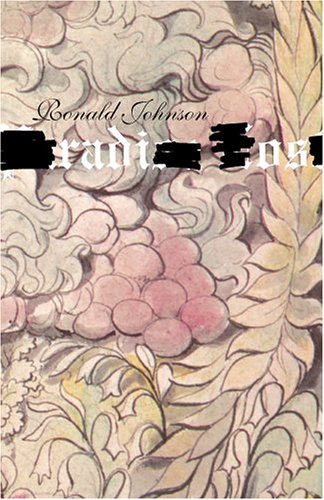


Full description not available
T**N
The divine fire of human Creation
What poet Ronald Johnson has done here seems so simple ... but it takes a truly gifted poet to create such a work. Using William Blake's idea of etching, or cutting away, he's gone through the first four books of Milton's epic poem "Paradise Lost," removing all but a few carefully chosen words & phrases from each page. What's revealed in the suddenly open space is a new poem of Creation, one of Song, Art, and primal forces from the soul & psyche of humanity.This would be difficult enough to do with just a single page, creating one new short poem; but Johnson has in fact made a new epic, a continuing poem, one that startles & delights with its unexpected conjoinings of unrelated words, and yields dazzling new images. This is the sort of work that invites the reader to pause & contemplate each page, and fill in the white space with his or her own thoughts & emotions. Additionally, it'll make the reader look at language anew, and marvel at its beauty, its precision, and its enormous flexibility. It'll make you savor words again -- most highly recommended!
K**O
Great found text
If you are already a fan of found poetry or are looking to learn, this book is a great resource. Ronald Johnson's erasure of Paradise Lost is one of the earliest erasures published in the U.S., and its arrangement on the page is a lovely artifact of its process.I used this book in a class I taught on found poetry and found it to be a perfect example of the topic.
T**E
Wouldn't Miss it for the World
A wonderful work, full of felicities and beauty. Johnson's concept is marvelous, the flow and spatial quality of it a joy. I can see how he thought of it as kind of a geodesic dome--a good deal of space enclosed within a structure spare in its use of materials. The Flood edition is characteristically impeccable: a beauty of a book.
J**A
A poem inside a poem
The great American poet Ronald Johnson decided to dig into John Milton's Paradise Lost in order to find a new poem, cooking new food for thought having to do with originality and authorship, taking into account that the words are originally Milton's. The reason for choosing this poem rather than others is to be found by each of you by scrutinazing even the empty prominence of the space inside the page, which the poem hardly touches.
N**L
Intriguing and stimulating read
Ronald Johnson's brand of 'found' poetry opens up many avenues for thought and inspiration. Here, the text is selected out of Milton's (Pa)RADI(se) (L)OS(t). It's also interesting to work through the original and follow Johnson's method. As I say, whole worlds open up.
Trustpilot
1 day ago
1 month ago